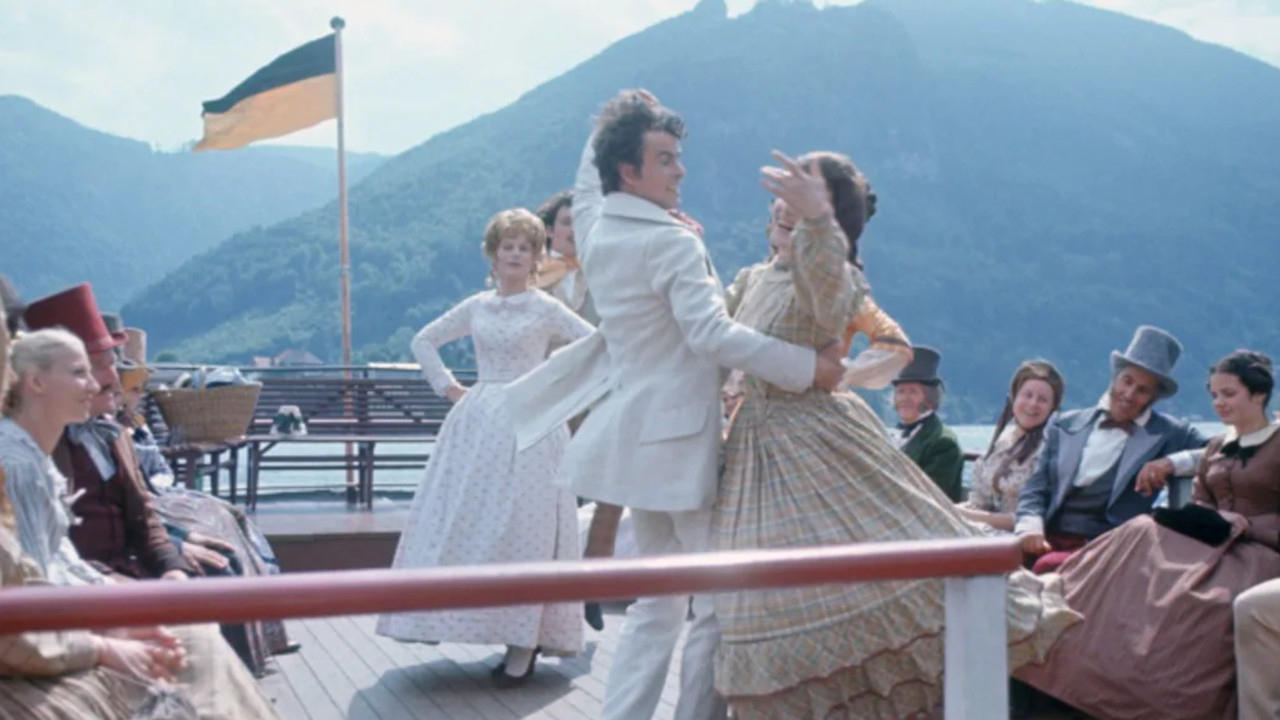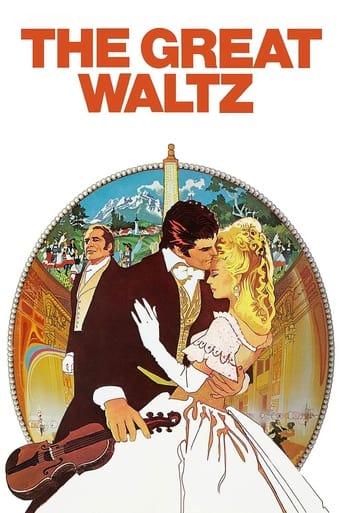

Self-important, over-dramatic, uninspired.
... View MoreRedundant and unnecessary.
... View MoreExcellent, a Must See
... View MoreIt isn't all that great, actually. Really cheesy and very predicable of how certain scenes are gonna turn play out. However, I guess that's the charm of it all, because I would consider this one of my guilty pleasures.
... View MoreI've always loved the music of Johann Strauss. Years ago I drove to a small theater in South Milwaukee to see the 1938 MGM movie *The Great Waltz*, a schmaltzy but well-made concoction with the inimitable Meliza Korjus and the very aggravating Louise Reiner that was very loosely based on Strauss's life. Also years ago I bought a recording of the 1949 musical *The Great Waltz*, on which this movie is very loosely based. Like *The Song of Norway*, which had been a huge success on Broadway in 1944, mostly because of its elaborate dance numbers, "The Great Waltz" was a Robert Wright/George Forrest concoction that used music by the composer whose biography was more or less the subject of the show.I never saw that show, so I don't know how similar this 1972 movie is to it. What I do know, however, is that this movie is a lavishly staged disaster. The script, what there is of it, is all cliches. (The scene where Strauss comes up with the idea for *Tales from the Vienna Woods* is stolen, poorly, from the 1938 movie.) It is interrupted repeatedly for no clear reason by a series of elaborate but not very interesting dance numbers. (Imagine an unimaginative *Seven Brides for Seven Brothers*.) Worse still, most of the characters are not likable. Strauss Jr. comes off as an unfeeling womanizer, like his father before him. Strauss' wife isn't likable enough to earn our sympathies, even though he is not good to her.In short, there's really nothing to like in this movie other than Strauss's music, which is well performed, and the scenery and costumes. (Much of the movie was evidently filmed in Austria.) The 1938 *Great Waltz* is not a great movie and has more than its share of chiches, but it's still a lot more enjoyable than this sad remake.
... View MoreThis big budget major Hollywood studio movie has never received a home video release, and it's pretty easy to guess why. Certainly there being no big stars in the cast plays a factor, as well as the fact that Strauss today is nowhere as popular as what plays on the radio most of the time nowadays. But I think another large factor dooming the movie to obscurity is that it comes across as very old fashioned. Even considering what society was like in the 1970s, I am sure people who saw the movie back then felt the movie played out more like a movie made 30 or so years earlier. There are a couple of additional problems with the movie. First, the movie's look into Strauss is for the most part lacking focus. For the most part, we don't learn what drove him, or what he was like as a person. There are large stretches of the movie when he becomes a secondary character. The second problem is that the movie has a number of touches that are unintentionally silly, from the singing narrator to the dance choreography.I will say the movie looks good, from the cinematography to the locations. In that aspect, the old saying that you can't polish a... well, you know... does not apply to this particular movie. But a glossy look doesn't really compensate that much for 135 otherwise misguided minutes.
... View MoreAs is the usual case with these type of pictures, the set decorations are absolutely opulent, but here the story line is interesting, but we've seen it so many times.The film chronicles the life of waltz king Johann Strauss, his competition with his father and his rise to fame once the latter dies suddenly.We also see the romance and eventual marriage to a diva, who was loved by a baron, in this film, nicely portrayed by Rosanna Brazzi.The singing and dancing are well staged and we see the film become more dramatic once the secret of his wife is revealed. Love conquers all is the general theme here.
... View MoreThis movie failed on several levels, most importantly on not knowing what its audience would enjoy. It was a big budget movie, with great stars, and a plot based on a true story of ambition, jealousy, betrayal, pride, and great music - seemingly the ingredients for a terrific film. The story, while intriguing, was not directed in a style that fit either the lavish Austrian locales or the wonderful music of Johann Strauss. It was more of a musical in the style of Broadway, with the music treated that way. Hardly any of Strauss' waltzes were played in their entirety, the main exception being one sung by opera singer Mary Costa. In the movie, when the composer's greatest waltz was being debuted at a dance, the dancers all stood still and started swaying back and forth with the music rather than waltzing - totally unbelievable for a "Great Waltz"! This same scene was then interrupted by a non-Strauss sequence showing printing presses, with a song about how popular the composition became. The last half of the Strauss music was never presented.If the movie was aimed at people who wanted to hear Broadway-style songs, it was marketed wrongly as the story of light classical music, so that audience did not go to see it. If it was aimed at people who wanted to hear Strauss waltzes, it tantalized without satisfaction.It is no wonder that this big-budget potential blockbuster closed early in theaters, and has all but vanished from public memory, never even having been put on VHS or DVD.
... View More